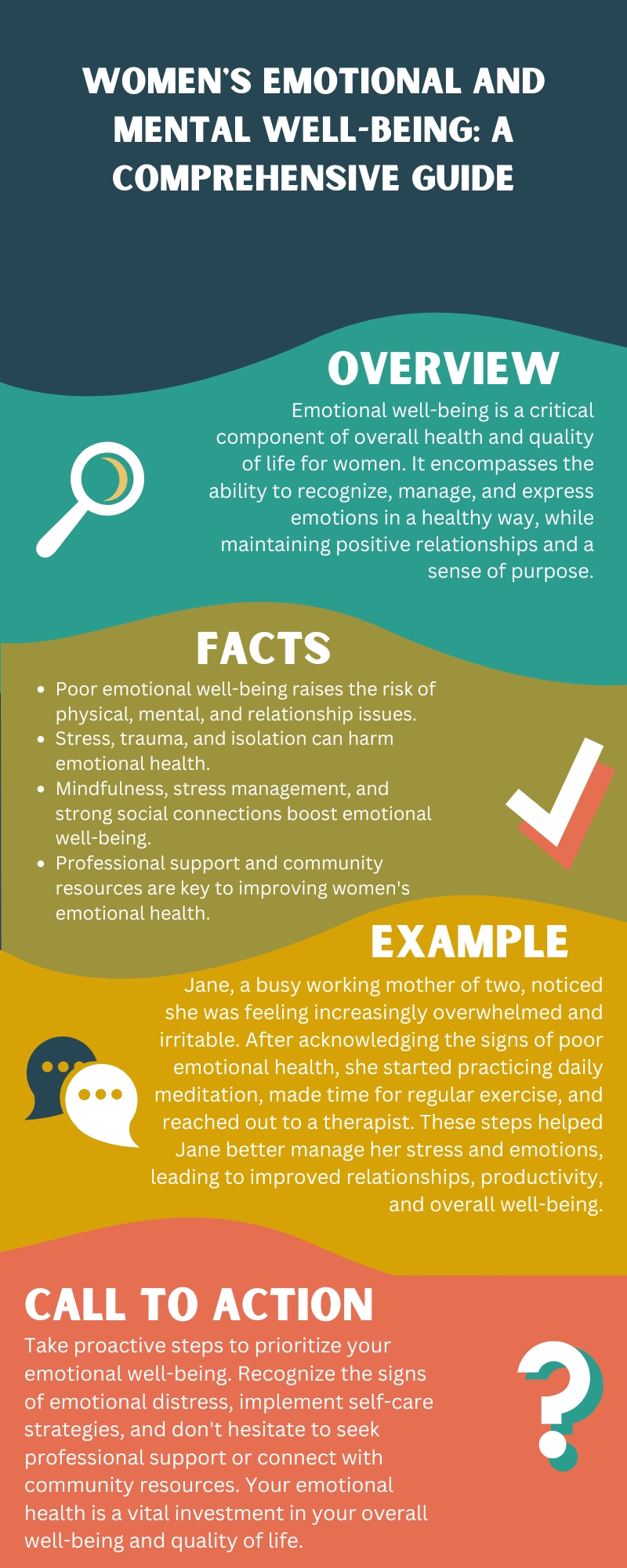Emotional health and well-being refer to the overall state of an individual’s emotional, psychological, and social functioning. It encompasses the ability to recognize, understand, and manage one’s emotions, as well as the capacity to form meaningful relationships, cope with challenges, and maintain a positive outlook on life.
Emotional well-being is a crucial component of an individual’s overall health and quality of life. It goes beyond simply feeling happy or content; it involves the ability to experience a range of emotions, including joy, sadness, anger, and fear, in a healthy and balanced way.
When an individual’s emotional well-being is strong, they are better equipped to navigate the ups and downs of life, find fulfillment in their relationships and activities, and maintain a sense of purpose and self-worth.
Key Takeaways:
- Emotional health and well-being encompass the ability to recognize, understand, and manage one’s emotions, as well as the capacity to form meaningful relationships and maintain a positive outlook on life.
- Emotional well-being is crucial for physical health, mental health, relationships, productivity, and overall life satisfaction.
- Factors like genetics, childhood experiences, stress, lifestyle, and social connections can all impact an individual’s emotional well-being.
- Promoting emotional well-being in children and adolescents is particularly important, as it lays the foundation for lifelong mental and emotional health.
- Older adults may face unique challenges that can impact their emotional well-being, such as retirement, physical health problems, and social isolation.
- Recognizing the signs of emotional distress, such as changes in mood, behavior, or social engagement, is the first step in seeking support and resources.
- Strategies to improve emotional well-being include mindfulness, stress management, cultivating a positive mindset, reinforcing social connections, and coping with loss and major life transitions.
- Various resources, such as hotlines, support groups, therapy, and community organizations, are available to support individuals struggling with emotional well-being.

What is Emotional Well-being?
Emotional well-being is a multi-faceted concept that encompasses several key elements:
- Emotional Regulation: The ability to recognize, understand, and manage one’s emotions healthily and constructively.
- Psychological Well-being: A sense of purpose, personal growth, and self-acceptance, as well as the ability to make autonomous decisions and maintain positive relationships.
- Social Well-being: The capacity to engage in meaningful social interactions, develop supportive relationships, and feel a sense of belonging within a community.
These different aspects of emotional well-being are interconnected and work together to support an individual’s overall mental and emotional health.

Why is Emotional Well-being Important?
Emotional well-being plays a crucial role in an individual’s overall health, relationships, and quality of life. Some of the key reasons why emotional well-being is so important include:
- Physical Health: Strong emotional well-being is associated with better physical health outcomes, including reduced risk of chronic diseases, improved immune function, and better cardiovascular health.
- Mental Health: Emotional well-being is closely linked to mental health, with a positive emotional state often serving as a protective factor against the development of mental health issues, such as depression and anxiety.
- Relationships and Social Connections: Individuals with strong emotional well-being tend to have more fulfilling and supportive relationships, as they are better able to communicate their needs, empathize with others, and resolve conflicts.
- Productivity and Performance: Emotional well-being has been shown to contribute to increased productivity, better decision-making, and greater overall life satisfaction.
- Resilience and Coping: Individuals with strong emotional well-being are better equipped to navigate and cope with life’s challenges, setbacks, and stressors.

Factors that Can Influence Emotional Well-being
Emotional well-being is influenced by a complex interplay of genetic, environmental, and lifestyle factors. Some of the key factors that can impact an individual’s emotional well-being include:
- Genetics and Biology: Certain genetic and biological factors, such as neurotransmitter imbalances or hormonal changes, can predispose individuals to emotional health challenges.
- Childhood Experiences: Adverse childhood experiences, such as trauma, abuse, or neglect, can have a significant impact on an individual’s emotional development and well-being.
- Stress and Trauma: Experiencing high levels of stress, major life events, or traumatic experiences can negatively affect emotional well-being.
- Lifestyle Factors: Elements like diet, exercise, sleep quality, and substance use can all influence an individual’s emotional state and overall well-being.
- Social Relationships: The quality and strength of an individual’s social connections, as well as their level of social support, can have a profound impact on their emotional well-being.
- Mental Health Conditions: Certain mental health conditions, such as depression, anxiety, or bipolar disorder, can directly impact emotional well-being.

Emotional Well-being in Children and Adolescents
Emotional well-being during childhood and adolescence is particularly important, as it lays the foundation for an individual’s lifelong mental and emotional health. During these formative years, emotional development is heavily influenced by a variety of factors, including:
- Family dynamics and parenting styles
- Peer relationships and social interactions
- Academic and extracurricular experiences
- Exposure to trauma or adverse life events
- Access to mental health resources and support
1. Tips to Improve Emotional Well-being in Children and Adolescents
To promote emotional well-being in children and adolescents, it is important to:
- Encourage open communication and emotional expression
- Foster a supportive and nurturing home environment
- Teach healthy coping strategies and problem-solving skills
- Promote physical activity, healthy sleep habits, and a balanced diet
- Provide access to mental health resources and professionals, if needed
- Maintain a strong support system of family, friends, and trusted adults
- Celebrate successes, validate emotions, and offer empathy and understanding.

Emotional Well-being in Older Adults
Emotional well-being in older adulthood is just as important as it is during other stages of life. However, older adults may face unique challenges that can impact their emotional health, such as:
- Retirement and changes in social roles
- Physical health problems and chronic illnesses
- Loss of loved ones and social connections
- Feelings of isolation or loneliness
- Cognitive decline or dementia
1. Strategies to Promote Emotional Well-being in Older Adults
To support the emotional well-being of older adults, it is important to:
- Encourage social engagement and the maintenance of strong social connections
- Promote physical activity and regular exercise to improve mood and cognitive function
- Provide access to mental health resources and support services, such as counseling or support groups
- Encourage the adoption of stress-reduction techniques, such as mindfulness, meditation, or deep breathing
- Facilitate the pursuit of new hobbies, learning opportunities, and meaningful activities
- Ensure access to high-quality healthcare and the management of any physical or cognitive health concerns

Signs a Person is Experiencing Difficulties with their Emotional Well-being
Recognizing the signs of emotional distress or poor emotional well-being is the first step in seeking the necessary support and resources. Some common signs that a person may be experiencing difficulties with their emotional well-being include:
1. In Children:
- Changes in mood, behavior, or academic performance
- Difficulty regulating emotions, such as frequent outbursts or tantrums
- Withdrawal from social activities or interactions
- Persistent feelings of sadness, anxiety, or fear
- Difficulty concentrating or paying attention
- Significant changes in sleep patterns or appetite
2. In Adults:
- Persistent feelings of sadness, hopelessness, or irritability
- Difficulty managing stress or emotions
- Changes in sleep patterns, appetite, or energy levels
- Withdrawal from social activities or relationships
- Difficulty concentrating or making decisions
- Increased use of alcohol, drugs, or other coping mechanisms
- Thoughts of self-harm or suicidal ideation
If you or someone you know is exhibiting these signs, it is important to seek support from a mental health professional or other appropriate resources.

Tips to Improve Emotional Health and Well-being
Enhancing emotional health and well-being requires a multifaceted approach that addresses various aspects of an individual’s life. Here are some tips that can help improve emotional well-being:
1. Be Mindful
- Practice mindfulness, meditation, or other forms of self-awareness techniques to improve emotion regulation and reduce stress.
- Engage in mindful activities, such as deep breathing, yoga, or journaling, to promote a greater sense of calm and inner peace.
2. Manage and Reduce Stress
- Identify and address the sources of stress in your life, such as work, relationships, or financial concerns.
- Implement healthy stress management techniques, such as exercise, relaxation practices, or time management strategies.
3. Try to Develop a Positive Mindset
- Cultivate a growth mindset, focusing on opportunities for personal growth and development.
- Practice gratitude and positive self-talk to promote a more optimistic outlook on life.
4. Reinforce Social Connections
- Nurture existing relationships and seek out new social connections that bring a sense of belonging and support.
- Engage in activities and hobbies that allow you to connect with others and build meaningful relationships.
5. Cope with Loss
- Acknowledge and process feelings of grief, loss, or major life transitions healthily and constructively.
- Seek support from friends, family, or mental health professionals to navigate difficult life events.

Resources and Support
If you or someone you know is struggling with emotional well-being, there are numerous resources and support options available:
| Resource | Description |
|---|---|
| Mental Health Hotlines | National and local hotlines that provide free, confidential support and crisis intervention. |
| Online Support Groups | Virtual communities that offer peer-to-peer support and connection for individuals experiencing emotional health challenges. |
| Therapy and Counseling | Professional mental health services, including individual, group, or family therapy. |
| Self-Help Books and Apps | Educational materials and digital tools that guide on improving emotional well-being. |
| Community Organizations | Local organizations and nonprofits that offer programs, classes, and support services related to mental and emotional health. |
Remember, seeking help and support is a sign of strength, and addressing emotional well-being is an important investment in one’s overall health and quality of life.
Summary
Emotional health and well-being are essential components of an individual’s overall health and quality of life. By understanding the multifaceted nature of emotional well-being, recognizing the factors that can influence it, and implementing strategies to promote it, individuals can take proactive steps to enhance their mental and emotional resilience.
Whether you are a parent, caregiver, or individual seeking to improve your emotional well-being, the resources and guidance provided in this blog article can serve as a valuable starting point.
Remember, taking care of your emotional health is not just a personal responsibility, but a vital investment in your overall well-being and the well-being of those around you.
FAQs
- Why is emotional well-being important for women?
Emotional well-being is crucial for women’s overall health, relationships, and quality of life. It supports physical and mental health, strengthens social connections, and enhances resilience. - What are the signs of poor emotional well-being in women?
Common signs include persistent negative emotions, changes in sleep and appetite, social withdrawal, difficulty managing stress, and unhealthy coping behaviors. - How can women improve their emotional health?
Key strategies include mindfulness, stress management, a positive mindset, maintaining social connections, and seeking professional support when needed. - What resources are available for women struggling with emotional well-being?
Resources include mental health hotlines, support groups, therapy, self-help materials, and community organizations focused on emotional and mental health.


